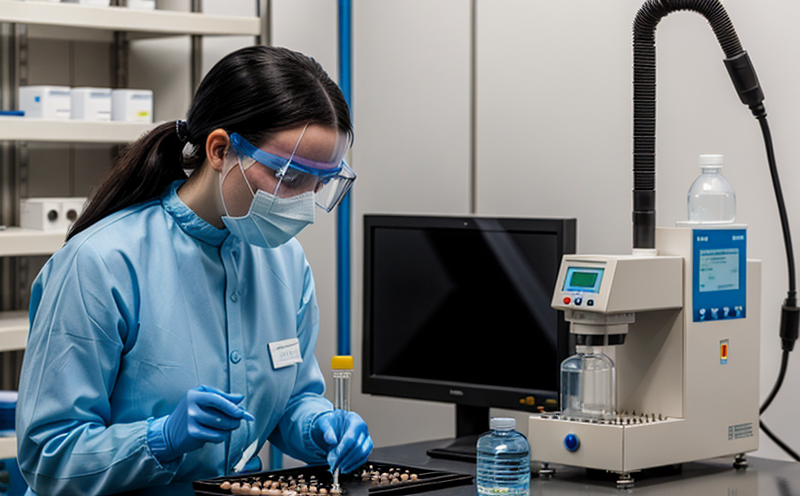Ion Chromatography Anion Profiling Testing
Ion chromatography anion profiling testing is a critical analytical method used in pharmaceutical testing to identify and quantify various anions present in a sample. This service is essential for ensuring the purity, quality, and safety of drugs during development and production stages.
The primary goal of ion chromatography (IC) is to separate ions based on their interactions with stationary phases within the column. For anion profiling specifically, this involves detecting negatively charged species such as chloride, bromide, iodide, nitrate, sulfate, phosphate, and others that are critical in drug formulations.
The process begins with thorough sample preparation, which includes dissolution of solid samples or extraction from matrices like tablets, capsules, or liquid formulations. This step ensures accurate representation of the ion content for analysis. Once prepared, these samples undergo injection into the high-performance liquid chromatography (HPLC) system equipped with a specialized anion exchange column.
The HPLC instrument used in this service typically employs a conductivity detector to measure electrical conductivity changes as ions pass through the column. This allows precise quantification of each ion component based on retention time and peak area.
Results from ion chromatography provide detailed information about the composition of anions within pharmaceutical products, which is crucial for regulatory compliance and product quality assurance. Regulatory agencies like the United States Food and Drug Administration (FDA), European Medicines Agency (EMA), and others require comprehensive data on impurity profiles as part of drug approvals.
Accurate identification and quantification of these ions help manufacturers ensure that their products meet stringent purity standards set forth by regulatory bodies worldwide. By providing reliable analytical support during drug development, manufacturing processes optimization, and quality control, our service plays a vital role in safeguarding public health.
Eurolab Advantages
At Eurolab, we pride ourselves on delivering exceptional ion chromatography anion profiling testing services tailored specifically to the pharmaceutical industry. Our expertise lies not only in state-of-the-art instrumentation but also in experienced professionals who understand both the science behind this technology and its real-world applications.
- Comprehensive Analytical Capabilities: We offer a wide range of ion chromatography methods, including those compliant with USP , USP , ICH Q6A, and other relevant guidelines.
- Accurate & Reliable Results: Leveraging advanced equipment from leading manufacturers like Thermo Fisher Scientific, Waters Corporation, Dionex, etc., we ensure precise measurements every time.
- Regulatory Compliance: Our team stays updated on the latest regulatory requirements and provides data that meets strict standards set by various international bodies.
- Custom Solutions: We work closely with clients to design bespoke testing protocols addressing their unique needs whether it's for development, production, or quality assurance purposes.
- Trained Personnel: Our analysts possess extensive knowledge and experience in pharmaceutical testing ensuring accurate interpretation of results.
Choose Eurolab for ion chromatography anion profiling testing services that exceed expectations. With our commitment to excellence and rigorous quality control processes, you can be confident in the accuracy and reliability of your test results.
International Acceptance and Recognition
Ion chromatography anion profiling testing is widely recognized by international standards bodies such as ISO, ASTM, EN, IEC, and others. Here are some key points regarding its acceptance:
- ISO/IEC 17025: Laboratories performing ion chromatography must comply with this internationally recognized standard for the competence of testing and calibration laboratories.
- USP : This official monograph specifies procedures for determining residual solvents in pharmaceutical products, which often involves ion chromatographic analysis.
- ICH Q6A: The International Council for Harmonisation guidelines emphasize the importance of impurity profiling during drug development phases. Ion chromatography supports this requirement by providing robust data on anion content.
- EMA Guidelines: The European Medicines Agency recommends ion chromatographic techniques for evaluating trace amounts of impurities in active pharmaceutical ingredients (APIs).
The widespread adoption of these standards underscores the significance of accurate and reliable ion chromatography anion profiling testing across different regions.
Use Cases and Application Examples
| Application Area | Description |
|---|---|
| Detection of Trace Impurities: | Ion chromatography can detect trace levels of impurities in API batches, ensuring they meet regulatory limits. |
| Quality Control During Manufacturing: | Continuous monitoring of manufacturing processes helps prevent contamination and maintains batch consistency. |
| Formulation Development: | Determining the optimal balance of ingredients is crucial for developing stable, effective medications. |
| Release Testing: | Ensuring that final product batches comply with defined specifications before distribution. |
| Stability Studies: | Evaluating how long a drug remains stable under various conditions is essential for its shelf life determination. |
| Compliance Audits: | Providing auditable data supporting compliance with regulatory requirements during inspections. |
In addition to these applications, ion chromatography anion profiling testing is also utilized in environmental monitoring related to pharmaceutical manufacturing operations. This helps ensure that there are no unintended releases of harmful substances into the environment.





